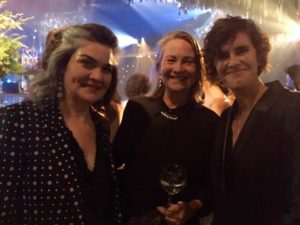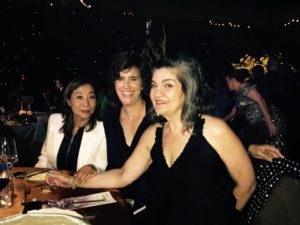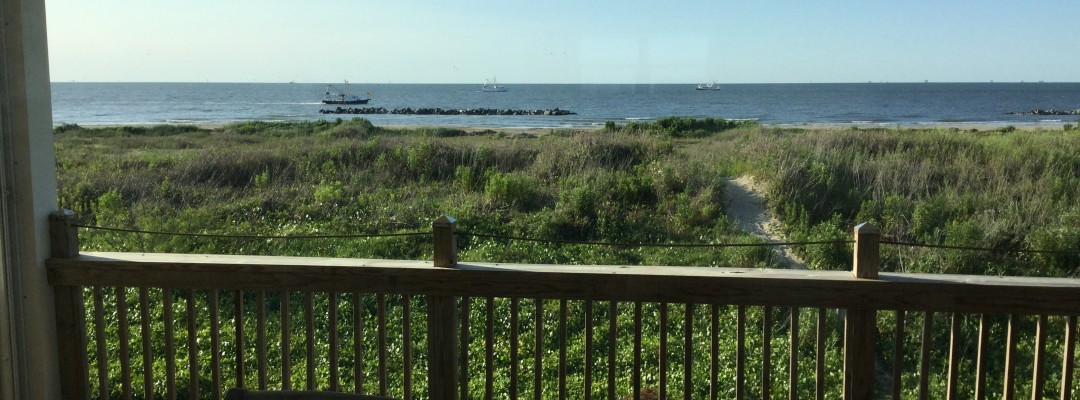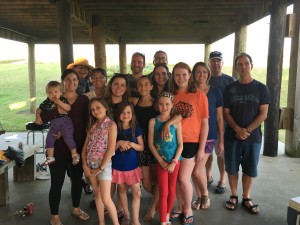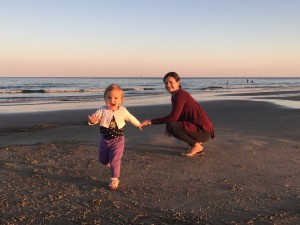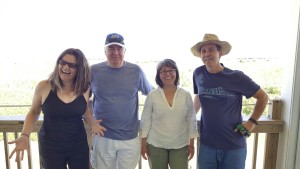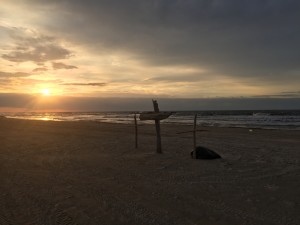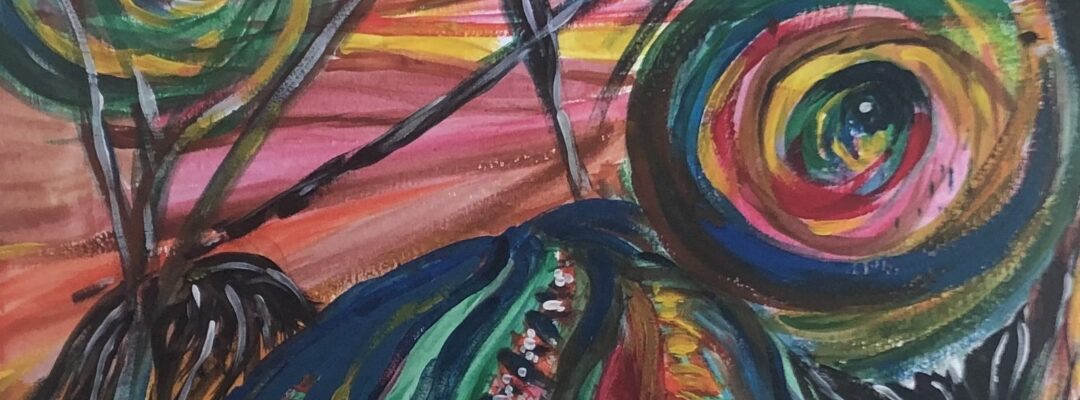
Picking Cherry Tomatoes in the Apocalypse By Julie Hébert
When I look up from my laptop I notice ash swirling in the air on the porch. I hear a distant siren signaling residents to evacuate. How long has that been ringing? It’s midafternoon. When I sat down here at eight in the morning I thought I had an hour or two of work. Seven hours later I’m still in my nightgown, and my neck, back, and right arm ache from being locked in position so long. I haven’t eaten or moved from this chair all day, but I finished the play, finally finding the right last line: “What are we waiting for?” I’m having trouble focusing my eyes. I blink repeatedly and look to the horizon—smoke flows over the mountaintop like a river undammed, ecstatic.
A little while later, when my husband races into the house, having just driven in from Los Angeles, I am undressing to get in the hot tub, which has a full view of the burning spectacle. I have a vague plan to submerge myself if the fire chooses this direction. He tells me people who tried that have been boiled to death. He’s been calling for hours, thinking I was trapped or the phone line had melted. (I’d unplugged it so I could work.) He tells me he had to argue with firemen and police who tried to stop him from driving into the fire zone. They blocked his way, threatened him. He told them, “Chase me, if you want, shoot me, but I’m going to get my wife,” and sped past them in his red Volkswagen Beetle, a burly tough guy in his teen-age-girl car, charging up the hill, finally on a mission worthy of his valor.
He is wound up and talking fast, insisting we leave immediately, but if this whole place is going to burn to the ground, I say… “I want to sit in the hot tub one last time.” I’ve been holding that soak in mind all day, pushing through the pain of my aching body to finish the play. I don’t want to leave yet, especially if I am never going to see this house again. We bought it after my brother died, a retreat from the public world of striving, a private, quiet place, a grieving house. I worked hard to find it, the right isolation, the right view, the right driving distance from home, something we could afford. I sacrificed to pay for it, fixed it up with treasures from junk stores and funky mementoes I’ve kept forever without knowing why. Here I understand why. This is my place, this is me, expressed in wood and cloth and trees and strange things that don’t make sense to anyone else. I can write here. Confounded, my husband indulges me. While I soak in the hot water watching wildfire snap at the darkening sky, he loads the cars with things he believes I’ll want, like my dead brother’s painting. Sensing I should move forward, I ease myself away from the mesmerizing fire, drift into the house. Standing in the shower I stare out the window at the spreading oaks, considering how long they’ve been alive, wondering if this will be their last day.
As I dress he tries to hurry me, but I won’t be rushed. The more upset he gets, the calmer I become, the slower I move. There’s always a fire, I think. I seem to be thickening like a pudding about to set. He’s asking what else I want him to put into our cars, but I look around this sanctified space filled with my sanctified things and it seems absurd to choose one over another: the armchair from my first play, my grandmother’s Extreme Unction kit, a notebook with animal sightings, my favorite gardening shirt…. Overflowing with memory, meaning, I can’t move.
My husband is now treating me like a mental patient incapable of making decisions for herself, dragging me out the front door. I want to lock it, but he says no; if firemen have to get in it’s better the door is unlocked. They won’t have to axe it down. I blink at him, imagining that, and wander toward the cars stuffed with belongings—books in laundry baskets, photos in soup pots, pillows jammed in crevices—refugee cars. He’s shouting directions, telling me to follow him. When he drove in, the emergency workers told him certain roads were closed, and now he’s telling me the way we have to go to get out. But I had heard all that, he’d said it before.
I know what I am going to do but I have to tell him delicately so he doesn’t freak out and physically force me into the car. He can’t make me drive, but he could abandon one car and drive off with me strapped down. “We need to pick the tomatoes.”
The look of exasperation on his face is laced with real concern for my sanity. I keep talking. “They’re ripe now; either they’ll be rotten when we get back or this is the last time I’ll have with my garden.” I see his mind calculating it will be faster to pick the tomatoes than fight me. I veer to the garden gate and ring the bell as I go in. Sacred ground. My grandfather Percy holds the center, a flourishing Salvia that blooms purple year-round; Great-grandpa Price stands outside the fence looking in, a Chinaberry tree who lost his mate too early; Papa Hébert is a wild climbing rose exploding white along two fence lines; José keeps watch behind him, a compact pine with feminine fanlike needles. My brother Mitch, a newly planted apple tree with seven white blossoms, bends over the wooden fence near the horse path. I put him there so years from now horses can bite into his fruit. The men always make me smile; the women are more complex.
Aunt Shirley had to be moved. I had her wild oregano in a shady herb corner with chocolate mint and lemon verbena, but she kept killing everything. When I gave in and planted her as an old-fashioned rose bush named after Lady Di, she blossomed and left me alone. Grandma Shepherd refused to be planted, and I realized her spirit is in the hummingbirds that dive and buzz and battle for territory, charming the guests.
Then there is Maman Hébert, Anita, impossible to please. I tried and tried and everything died. My sister came with a dream image of the old lady wearing a crown, and we prayed and planted coronets and tiara-like bushes and laughed and read poems and performed rituals and everything died. I replanted and dug and fertilized and watered, this and that and this and that, and everything died. I didn’t have the heart to tell my sister, so I replicated the dead plant she’d put in the ground with a fresh one before she came to visit. It died. I had the shadow of a thought on the periphery of my mind and threw agave pups in the dry dirt of my grandmother’s area. I didn’t water them, I didn’t do anything; they took root, growing fast and hard. I gently stroke the sharp spikes, a dangerous plant to last a hundred years, offering intoxicating mescal if anyone cares to work for it. Here she was at last: the matriarch, fierce, crowned.
The last thing Anita did before she died was walk through her vegetable garden. After a series of strokes and surgeries, she forced my father to get her out of the hospital and take her home. Wearing sensible pumps and a belted print rayon dress, her sutured neck splattered with bright orange mercurochrome, like flames on a hillside, she eased between the familiar rows of green beans, okra, and tomatoes. She could no longer speak, didn’t recognize her grandchildren, but she knew these plants. Touching them was her final act.
My poor husband strips cherry tomato vines by the dozen, uprooting whole plants, jamming them into a paper bag, keeping an eye on the wildfire roiling down the mountain in the distance. “Can we go now?! What are we waiting for?”
When I look up from my laptop I notice ash swirling in the air on the porch. I hear a distant siren signaling residents to evacuate. How long has that been ringing? It’s midafternoon. When I sat down here at eight in the morning I thought I had an hour or two of work. Seven hours later I’m still in my nightgown, and my neck, back, and right arm ache from being locked in position so long. I haven’t eaten or moved from this chair all day, but I finished the play, finally finding the right last line: “What are we waiting for?” I’m having trouble focusing my eyes. I blink repeatedly and look to the horizon—smoke flows over the mountaintop like a river undammed, ecstatic.
A little while later, when my husband races into the house, having just driven in from Los Angeles, I am undressing to get in the hot tub, which has a full view of the burning spectacle. I have a vague plan to submerge myself if the fire chooses this direction. He tells me people who tried that have been boiled to death. He’s been calling for hours, thinking I was trapped or the phone line had melted. (I’d unplugged it so I could work.) He tells me he had to argue with firemen and police who tried to stop him from driving into the fire zone. They blocked his way, threatened him. He told them, “Chase me, if you want, shoot me, but I’m going to get my wife,” and sped past them in his red Volkswagen Beetle, a burly tough guy in his teen-age-girl car, charging up the hill, finally on a mission worthy of his valor.
He is wound up and talking fast, insisting we leave immediately, but if this whole place is going to burn to the ground, I say… “I want to sit in the hot tub one last time.” I’ve been holding that soak in mind all day, pushing through the pain of my aching body to finish the play. I don’t want to leave yet, especially if I am never going to see this house again. We bought it after my brother died, a retreat from the public world of striving, a private, quiet place, a grieving house. I worked hard to find it, the right isolation, the right view, the right driving distance from home, something we could afford. I sacrificed to pay for it, fixed it up with treasures from junk stores and funky mementoes I’ve kept forever without knowing why. Here I understand why. This is my place, this is me, expressed in wood and cloth and trees and strange things that don’t make sense to anyone else. I can write here. Confounded, my husband indulges me. While I soak in the hot water watching wildfire snap at the darkening sky, he loads the cars with things he believes I’ll want, like my dead brother’s painting. Sensing I should move forward, I ease myself away from the mesmerizing fire, drift into the house. Standing in the shower I stare out the window at the spreading oaks, considering how long they’ve been alive, wondering if this will be their last day.
As I dress he tries to hurry me, but I won’t be rushed. The more upset he gets, the calmer I become, the slower I move. There’s always a fire, I think. I seem to be thickening like a pudding about to set. He’s asking what else I want him to put into our cars, but I look around this sanctified space filled with my sanctified things and it seems absurd to choose one over another: the armchair from my first play, my grandmother’s Extreme Unction kit, a notebook with animal sightings, my favorite gardening shirt…. Overflowing with memory, meaning, I can’t move.
My husband is now treating me like a mental patient incapable of making decisions for herself, dragging me out the front door. I want to lock it, but he says no; if firemen have to get in it’s better the door is unlocked. They won’t have to axe it down. I blink at him, imagining that, and wander toward the cars stuffed with belongings—books in laundry baskets, photos in soup pots, pillows jammed in crevices—refugee cars. He’s shouting directions, telling me to follow him. When he drove in, the emergency workers told him certain roads were closed, and now he’s telling me the way we have to go to get out. But I had heard all that, he’d said it before.
I know what I am going to do but I have to tell him delicately so he doesn’t freak out and physically force me into the car. He can’t make me drive, but he could abandon one car and drive off with me strapped down. “We need to pick the tomatoes.”
The look of exasperation on his face is laced with real concern for my sanity. I keep talking. “They’re ripe now; either they’ll be rotten when we get back or this is the last time I’ll have with my garden.” I see his mind calculating it will be faster to pick the tomatoes than fight me. I veer to the garden gate and ring the bell as I go in. Sacred ground. My grandfather Percy holds the center, a flourishing Salvia that blooms purple year-round; Great-grandpa Price stands outside the fence looking in, a Chinaberry tree who lost his mate too early; Papa Hébert is a wild climbing rose exploding white along two fence lines; José keeps watch behind him, a compact pine with feminine fanlike needles. My brother Mitch, a newly planted apple tree with seven white blossoms, bends over the wooden fence near the horse path. I put him there so years from now horses can bite into his fruit. The men always make me smile; the women are more complex.
Aunt Shirley had to be moved. I had her wild oregano in a shady herb corner with chocolate mint and lemon verbena, but she kept killing everything. When I gave in and planted her as an old-fashioned rose bush named after Lady Di, she blossomed and left me alone. Grandma Shepherd refused to be planted, and I realized her spirit is in the hummingbirds that dive and buzz and battle for territory, charming the guests.
Then there is Maman Hébert, Anita, impossible to please. I tried and tried and everything died. My sister came with a dream image of the old lady wearing a crown, and we prayed and planted coronets and tiara-like bushes and laughed and read poems and performed rituals and everything died. I replanted and dug and fertilized and watered, this and that and this and that, and everything died. I didn’t have the heart to tell my sister, so I replicated the dead plant she’d put in the ground with a fresh one before she came to visit. It died. I had the shadow of a thought on the periphery of my mind and threw agave pups in the dry dirt of my grandmother’s area. I didn’t water them, I didn’t do anything; they took root, growing fast and hard. I gently stroke the sharp spikes, a dangerous plant to last a hundred years, offering intoxicating mescal if anyone cares to work for it. Here she was at last: the matriarch, fierce, crowned.
The last thing Anita did before she died was walk through her vegetable garden. After a series of strokes and surgeries, she forced my father to get her out of the hospital and take her home. Wearing sensible pumps and a belted print rayon dress, her sutured neck splattered with bright orange mercurochrome, like flames on a hillside, she eased between the familiar rows of green beans, okra, and tomatoes. She could no longer speak, didn’t recognize her grandchildren, but she knew these plants. Touching them was her final act.
My poor husband strips cherry tomato vines by the dozen, uprooting whole plants, jamming them into a paper bag, keeping an eye on the wildfire roiling down the mountain in the distance. “Can we go now?! What are we waiting for?”

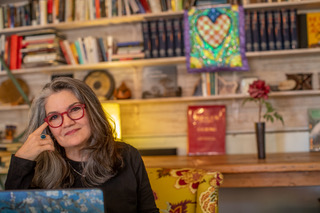
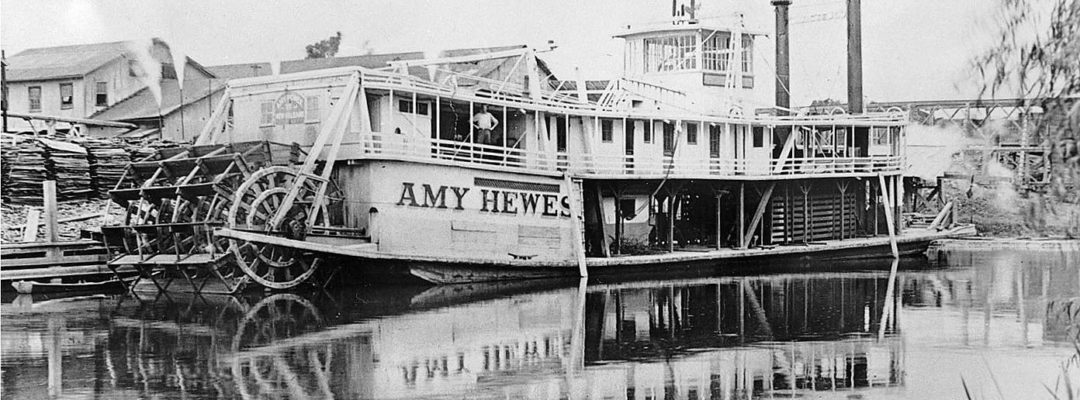
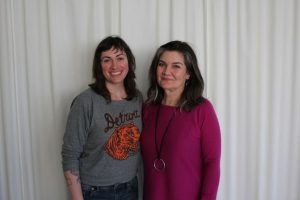

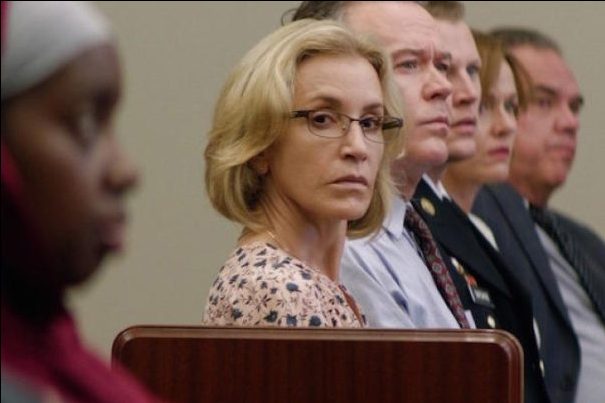
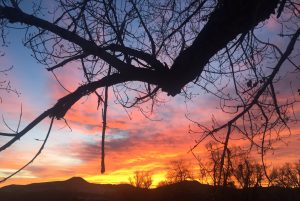

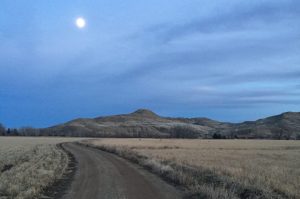 All said, it was the most productive time I’ve had as a writer in many years and I could not be more grateful to Ucross and to Mame Hunt and Roberta Levitow for introducing me there. BTW— I’m now working at home at my new standing desk! Fingers crossed to keep the productivity going…
All said, it was the most productive time I’ve had as a writer in many years and I could not be more grateful to Ucross and to Mame Hunt and Roberta Levitow for introducing me there. BTW— I’m now working at home at my new standing desk! Fingers crossed to keep the productivity going…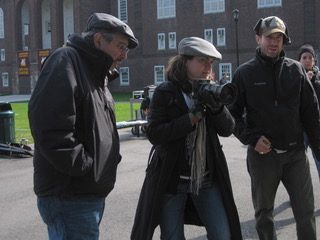

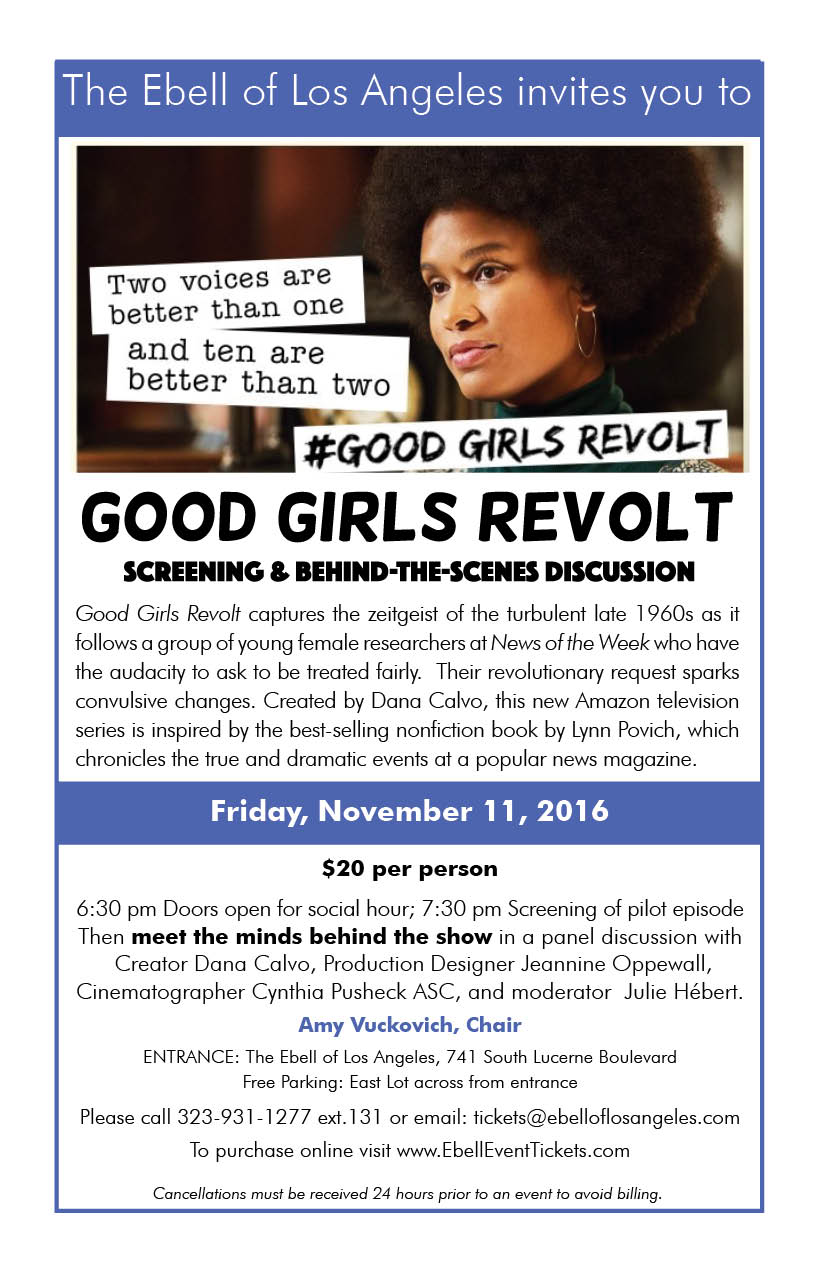
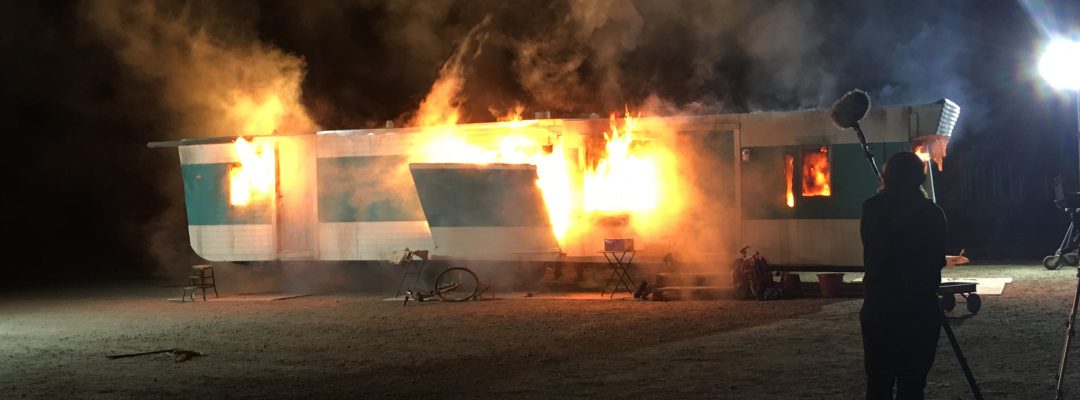
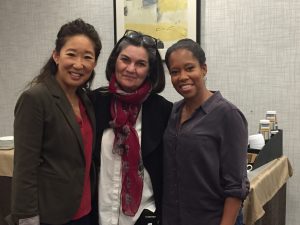
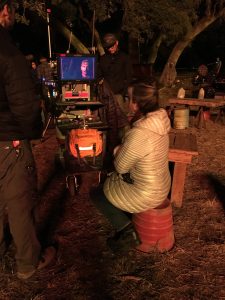
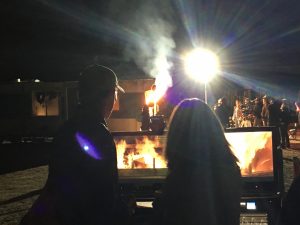
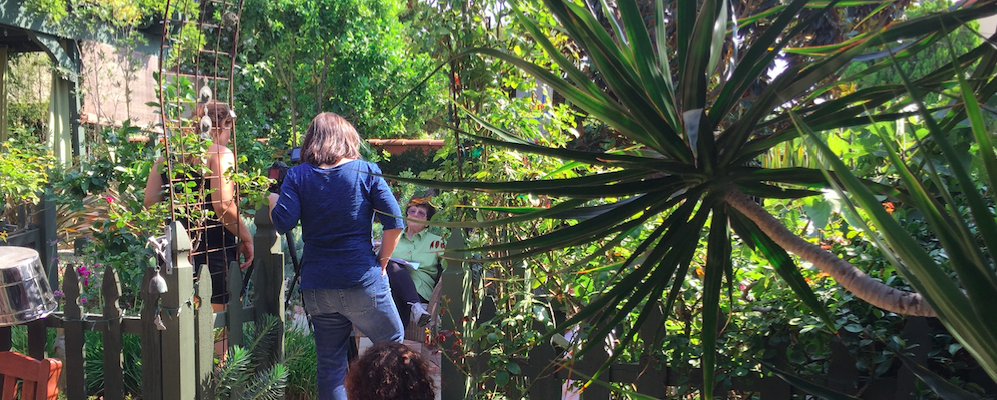
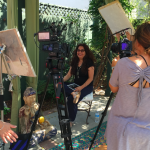
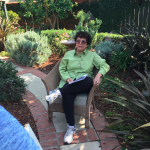
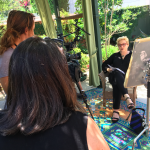

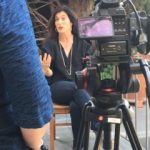
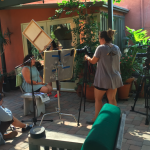
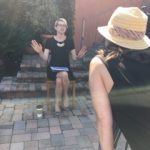
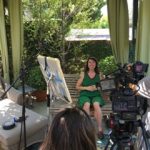
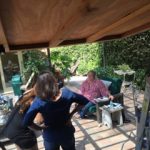

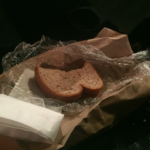
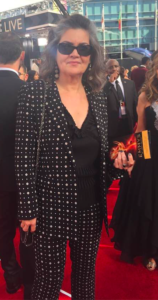 e red carpet was more chill this time, too, despite the 100 degree heat because they’d erected a cover and hedges and had water available and all the folks guiding us along were cheery and helpful. They did a great job of moving thousands of socializing people into place for an on-time start to a live broadcast. Not easy and they did it with grace. I don’t know if it was aired on the Emmy broadcast, but before the show started three kids from Stranger Things sang and danced Uptown Funk and I LOVED it. They were adorable and fun and super-talented. Glad I was in my seat ahead of time to see it.
e red carpet was more chill this time, too, despite the 100 degree heat because they’d erected a cover and hedges and had water available and all the folks guiding us along were cheery and helpful. They did a great job of moving thousands of socializing people into place for an on-time start to a live broadcast. Not easy and they did it with grace. I don’t know if it was aired on the Emmy broadcast, but before the show started three kids from Stranger Things sang and danced Uptown Funk and I LOVED it. They were adorable and fun and super-talented. Glad I was in my seat ahead of time to see it. we tromped over to the Governor’s Ball (my feet in stiletto heels were beginning to scream at this point… ah, vanity…) but when we walked in– the decor was breathtaking. Kenn says it’s like the most over-the-top high school prom you can imagine. Last year it felt like we’d been catapulted out into the universe and this year it was more Hobbit-like with lush, draped greenery
we tromped over to the Governor’s Ball (my feet in stiletto heels were beginning to scream at this point… ah, vanity…) but when we walked in– the decor was breathtaking. Kenn says it’s like the most over-the-top high school prom you can imagine. Last year it felt like we’d been catapulted out into the universe and this year it was more Hobbit-like with lush, draped greenery 
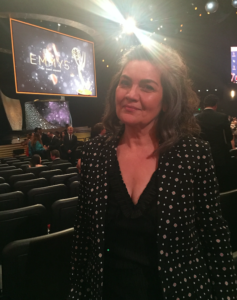 table then wandered around talking to friends and colleagues. Very happy to see some of our brilliant Season Two cast including Joey Pollari, Elvis Nolasco and Connor Jessup, as well as Ms. Cherry Jones, who will be joining us for Season Three. Damn, it’s fun to know amazingly talented people who are all such sweethearts.
table then wandered around talking to friends and colleagues. Very happy to see some of our brilliant Season Two cast including Joey Pollari, Elvis Nolasco and Connor Jessup, as well as Ms. Cherry Jones, who will be joining us for Season Three. Damn, it’s fun to know amazingly talented people who are all such sweethearts.
